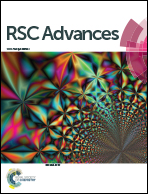Ligand-free N-arylation of heterocycles using metal–organic framework [Cu(INA)2] as an efficient heterogeneous catalyst†
Abstract
A metal–organic framework [Cu(INA)2] was synthesized and used as a heterogeneous catalyst for arylation of a wide range of N–H heterocycles and aryl halides under ligand-free conditions. The N-arylation reaction involved the use of 5 mol% Cu-MOF catalyst with K3PO4 or tBuOLi as the base in dimethylacetamide (DMA) solvent at 100 °C in 6 h. [Cu(INA)2] exhibited higher catalytic activity for the N-arylation transformation than that of common homogeneous copper catalysts and other Cu-MOFs with unsaturated open metal sites such as Cu2(BDC)2(BPY), Cu3(BTC)2, and Cu2(BDC)2(DABCO). Interestingly, reaction conditions are compatible with a wide range of N–H heterocycles, functional groups, and aryl chlorides. A leaching test indicated no contribution of leached active species in the reaction filtrate. Furthermore, the [Cu(INA)2] catalyst could be facilely separated from the reaction mixture and recovered and reused several times without a significant degradation in catalytic activity.
![Graphical abstract: Ligand-free N-arylation of heterocycles using metal–organic framework [Cu(INA)2] as an efficient heterogeneous catalyst](/en/Image/Get?imageInfo.ImageType=GA&imageInfo.ImageIdentifier.ManuscriptID=C5RA24165K&imageInfo.ImageIdentifier.Year=2015)

 Please wait while we load your content...
Please wait while we load your content...